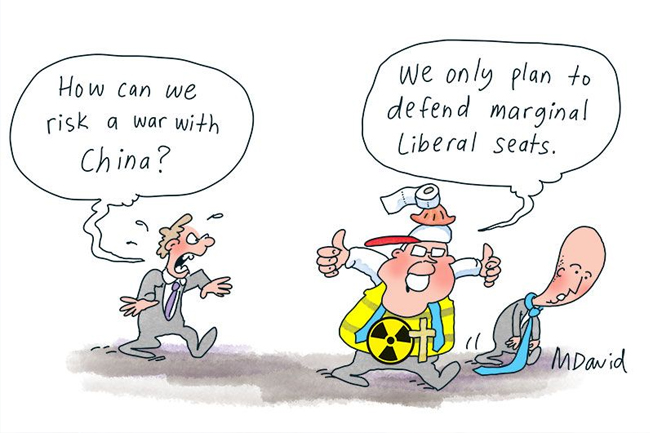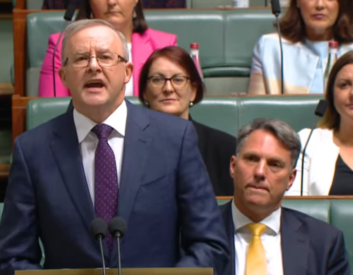The Greens are squandering the electoral opportunities offered by widespread public dissatisfaction with the major parties and their unpopular policies, writes Dr Geoff Davies.
DISAFFECTION WITH OLD PARTIES and old politics continues to grow, here and abroad. Unlike the US and the UK, however, progressive politics in Australia is hardly progressing. The Greens are the obvious standard-bearer, but so far they are missing the wave. It matters because the destruction of the informed, fair-go society and the sell-out of our sovereignty continue apace.
In the recent election, the Greens pulled only 10.3% of the 23% of primary votes that went to non-major parties in the House. For the Senate, they got 8.65% of around 35% of non-major primary votes.
Richard Denniss, writing in the August Monthly, notes that the most common ground among the disparate new cross benchers is opposition to the neoliberal program of free trade, trickle-down economics and privatisation. Yet they are more reactionary than progressive. Several claim global warming is a hoax and many are intolerant of progressive social causes. The Xenophon Team are reasonably sensible as far as they go but there is no broader vision of Australia’s direction.
With that perspective, a well-pitched progressive party could arguably be pulling 15-20% of the vote in Australia, perhaps much more. The rising wave of discontent has been evident now for several election cycles. There is also good evidence that Australians want a more compassionate, less frenetic, greener society with sovereignty over all our affairs. Yet good people have fears too and they may turn to reactionaries if they see no-one else as viable. Perhaps the Greens still don’t really believe they can aspire to government, so their message is not convincing.
Some clues emerge from Paddy Manning’s account of the Greens’ recent election campaign, also in the Monthly. It emerges that apparently many Greens, perhaps especially in NSW, see themselves only as a protest or balance of power party and have little interest in gaining more votes. Evidently, they imagine that can only be done by compromising their principles and moving to the “centre”.
A good hard look at the Greens: Can they ever bust through the hipster-proof fence? https://t.co/1l6WtVVkAZ
— The Monthly (@THEMONTHLY) August 9, 2016
One can appreciate the general point, especially given the modern history of Labor, but they must be particularly oblivious to have missed all the signs of the rising discontent with politics-as-usual. Many people are desperately looking for something better than inequality, exported jobs, rising social conflict, and being priced out of housing, higher education and, if the Liberals had their way, healthcare.
One must also wonder at protesters who evidently never expect to change anyone’s mind. The neoliberals never had such doubts, and dragged the “centre” far to the right. We need to drag it back.
People don’t necessarily want populist reactionaries. Social researcher Richard Eckersley, reporting in a recent issue of Oxford Development Studies, asked people to choose between two scenarios. The first was a fast paced, competitive, individualist society focusing on wealth generation and the good life. The second was a greener, more stable society emphasising cooperation, community, family, less inequality and greater economic self-sufficiency. 75% of people expected the first scenario, but fully 93% preferred the second.
So most people don't like our current direction, but they don't know how to change it. There is the opening for a progressive political party.
There is actually even greater potential. One of the least-acknowledged truths of the modern world is that free markets have no sensible basis in theory and their track record is poor and getting worse, as I have explained in my book Sack the Economists.
Economic performance in the neoliberal era since 1980 has never come close to that of the postwar decades until the early 1970s. The earlier social democratic era featured GDP growth of 5.2%, unemployment a minuscule 1.3% and inflation 3.3%. Neoliberal mediocrity has been partly disguised by steadily rising private debt that has caused one huge financial crash and threatens more.
The difficulties of the 1970s were mostly extraneous: oil prices quadrupled and the US paid for the Vietnam war by printing money and stoking inflation. Those problems could have been overcome without abandoning the social democratic approach.
The theory that says free markets are best applies to an absurdly abstract world that has no serious relevance to real economies. It’s not hard to understand why either. Don’t be intimidated by neoliberalism, it’s a paper tiger.
Most of the so-called Left has missed these simple, basic facts. Bernie Sanders and Jeremy Corbyn are quite sensible to propose a return to democratic socialism. (We could do even better, but that’s a story for later.)
So people want a greener, less conflicted and more compassionate society, and they can have it by voting for social democracy. Then why aren't the Greens reaping the benefit?
I grant the mendacious hostility of the Murdoch press and the major parties has been a difficulty, along with the disparaging condescension of much of the commentariat. Why not meet Murdoch head on, the way Scott Ludlum took on Tony Abbott in his Senate speech?
Call the lies and distortions. Make it so every time Murdoch screeches the Greens vote goes up. The rest of the media love a fight and might even report it.
I agree with Paddy Manning that putting out detailed costings only provides grist for Murdoch’s lies, and the distraction of debates about forward projections. It would be easy instead to simply to point to potential savings of tens of billions of dollars and to say there is great scope for implementing many Greens policies. Most voters don't care about all the numbers anyway, especially while the Greens are well away from forming a government.
But perhaps that focus on detailed numbers is symptomatic. The Greens, in origin, and still in name and mainstream image, are an environmental protest party, with minority social causes added more recently. They’re trying to look safe and serious, but if you try too hard you just show your insecurity.
The Greens have developed the broad policies of a mainstream party, but their strategy seems still to be that of a fringe party. Gaining a few per cent and a few seats per election might be the strategy for less critical times, but there are much bigger changes brewing. They’re paddling hard but don’t seem to notice the looming wave.
What is lacking is a simple narrative that cuts through. Sanders and Corbyn have found themes that resonate, now we need themes that resonate in Australia. Easy to say, I know.
Jobs and job security have to be front and centre and that means, all you lovely tree-huggers, talking up front about a clean, smart, caring economy. Other potential themes are fairer flows of wealth, accessibly-priced housing, education and health care, sovereignty over land and money flows, and a liveable planet with a live Reef.
Clean energy, energy efficiency and healthy food create more jobs than mining and agribusiness, so the jobs message is there to be used. Job security will come not only from returning some power to employees but also from protecting small business and farmers from corporate depredations (think ColesWorth), and from cultivating a thriving (clean) industrial ecosystem, a concept largely absent from mainstream thinking.
Fairer flows of wealth can be assured not only through minimum wage and tax policies, but also by slowing the mechanisms that unfairly pump wealth to the wealthy, like financial market speculation, developer capture of rising land values, unnecessarily concentrated ownership, and more.
Yes I said a caring economy. The choice is not just between monster capitalism and big socialism, that’s a false dichotomy. Markets always function under rules and, at present, the rules are rigged to favour the rich. They can be changed to share wealth more fairly and to promote quality of life instead of more and more stuff. That’s why the post-war decades were better and we can do better again. All the green and social causes will be much easier to take care of if we’re pushing downhill, not uphill.
Offer a healthy society. People want more time with family and community, they want government ownership of major services and Aussie icons, and they want healthy cultural institutions — all things our parents could afford but we allegedly can’t. The present wave of intolerance is fed by job and income insecurity, so addressing those concerns can take oxygen from the xenophobes and ranters.
Or how about just democracy, sovereignty and sanity? I’m thinking of corrupt major parties that accept millions from vested interests, sell the ground from under us, invite foreign investment sharks to run our affairs, and sell the coal that will tip us into catastrophic warming, all the while viciously defending us from people in leaky boats who generally make excellent citizens.
Outstanding long piece from Martin Jacques:The death of neoliberalism and the crisis in western politics Take note https://t.co/lmiIE2Tyhc
— mike campbell (@mikecampbell3) August 21, 2016
I have argued in my book that of the three modern party groups the Greens are actually closest to Menzies’ policies of the 1950s and 60s. By today’s standards, Menzies was a lefty, a mild social democrat. The modern Liberal Party has been captured by IPA extremists and Labor follows meekly along. So disaffected Liberal and Labor voters are both fair targets, without compromising the Greens message.
Politics – and the world – are likely to be transformed within the next five to ten years through financial and political collapses, global warming, resource shortages and tides of displaced people. We will move towards either a police-state corporate colony or a greener, fair-go, resilient society. Which way we go will depend on the leadership we have.
There are a number of nascent progressive parties, but they have yet to gain traction. The Greens are established and functioning. Since Labor abandoned the field they are the only option. If they are to lead, they need to be willing to keep adapting until they catch the wave.
It is not a time to play safe. Can the Greens step up to the challenge?
Dr Geoff Davies is a scientist and commentator who has been delving into economics for nearly 20 years. He is the author of Sack the Economists (Nov 2013) and blogs at betternature.wordpress.com. He is not a member of any political party.

This work is licensed under a Creative Commons Attribution-NonCommercial-NoDerivs 3.0 Australia License
Monthly Donation
Single Donation
Catch the wave. Subscribe to IA for just $5 a month (or less).









